Table of Contents
Introduction
The Motivation For This Article
Throughout the 20th century, it was very tough to make a living within the chess world.
Unless you were an absolute top player – preferably from a country like Soviet Union where you also received a stipend – it was virtually impossible to make a living within the chess world. 1
In the 21st century, the situation changed radically. Due to the rise and spread of the Internet and websites such as Youtube or Twitch, many fields, and niches experienced a dramatic change. Chess in particular turned out to be very susceptible to reaping all the benefits of the latest technological advances.
Especially since the last few years witnessed an unprecedented increase in interest in chess due to the fact people were locked at home during the covid and due to Netflix’s hit show The Queen’s Gambit. This “Chess Boom” dramatically increased the potential audience/number of customers using chess products and services. This made chess as a business niche more attractive to potential sponsors, increasing the influx of money within the chess world and the number of opportunities within the chess world.
It has become “easier than ever” to not only make ends meet – but to actually try and turn chess into a full-time career.
While I definitely agree the fact that more and more people are able to make a living within the chess world is a positive thing, 2 I do think there are also negative sides to the same coin.
As in any niche that has a lot of opportunities/money within, in recent times, we are witnessing an increased obsession with money/materialistic values within the chess world. Irrespective whether we are talking about streamers and influencers discussing their views and income, coaches bragging about how many students they have, endless discussions about how prize funds in top tournaments are inadequate or companies such as chess.com constantly talking about new records they are breaking, it seems there more and more businesses and individuals heavily focusing on making as much money as possible – and pushing the narrative/messaging it is an endeavor worth pursuing.
Since I fundamentally disagree with such a narrative/viewpoint, since many things associated with it annoy me to death, and since I like to shove my opinions down other people’s throats, I have decided to write this article.
This is not the first time I am writing about this topic. In my past review of the Chess Experience Podcast, I already expressed my dislike for the host’s business product/model and my feeling he is in it primarily for the money. I also talked about my disdain for materialistic values in terms of clicks/popularity in one of my previous newsletters.
However, since I felt I didn’t do a very good job of explaining the fundamental philosophy/viewpoint behind my reasoning in these past two articles, I would like to take this opportunity to talk about my philosophy in a bit more detail.
In order to do so, I do need to bring a very specific book into the conversation.
The High Price Of Materialism.
The Problem Of Overvaluing Materialistic Values: The High Price Of Materialism
Note: If you want to avoid the prolonged elaboration of my personal philosophy, I suggest skipping ahead to the next part of the article
I know many of you might be wondering: „But what exactly is the problem with materialistic values”? In order to answer the question, allow me to talk about one of my favourite books of all time – The High Price of Materialism.
As the title suggests, the book is essentially a treatise against materialism. That is not to say that the book doesn’t recognize that materialistic values are important – just that after a certain threshold there is very little correlation between materialistic values and our happiness:
„Each of these studies reveals that beyond the point of providing for food, shelter, and safety, increases in wealth do little to improve people’s well-being and happiness.”
The book describes in great detail how materialistic values are ingrained very deeply in our modern culture/society. How we are taught from a very early age to put a high emphasis on them – at the expense of other, more fulfilling values. 3 More importantly – it talks in great detail about all the negative consequences that overvaluing these values can have on our overall well-being.
For example, the book states that:
- People with a strong focus on materialistic values have worse social life as they have poorer quality of relationships
People who focus on materialistic aims often do so at the “expense” of their relationships, however. Many thinkers and social critics have commented on this phenomenon. […] What these and other thinkers note is that materialistic values “crowd out” other meaningful pursuits, as the time we “spend” earning and consuming often means neglect of our spouses, children, friends, and community. […] Other studies find that materialistic individuals experience more alienation in their social relationships than nonmaterialistic people.
- Or relationships of poorer quality
Barry Schwartz has called these “instrumental friendships,” writing that in capitalist, consumeristic societies “all that is required is that each ‘friend’ can provide something useful to the other. Instrumental friendships come very close to being market-like, contractual relations, with personal contact and the knowledge of mutual interdependence substituting for formal contractual documents.”
- People with strong materialistic tendencies tend to be less intrinsically motivated
At least three aspects of a materialistic value orientation work against intrinsically motivated experiences, and therefore against satisfying these needs. First, it leads individuals to become more focused on external rewards that might be gained by activities than on interest, challenge, and flow. This undermines intrinsic motivation, and thus autonomy and agency.
- People with strong materialistic values tend to report lower levels of self-actualization and higher levels of depression and anxiety
Compared with students who were more oriented toward self-acceptance, affiliation, or community feeling, those who considered financial success a relatively central value reported significantly lower levels of self-actualization and vitality, as well as significantly higher levels of depression and anxiety.
- People with strong materialistic values experience less freedom and lower degrees of self-expression
First, we will see that people with a strong orientation to materialism tend to place less value on freedom and self-expression, and thus decrease their likelihood of having experiences characterized by these qualities.
- People with strong materialistic values tend to be more narcissistic
Thus it was not surprising to find that students with strong materialistic tendencies scored high on a standard measure of narcissism.
- People with strong materialistic values tend to have more physical issues.
Adults who focused on money, image, and fame reported less self-actualization and vitality, and more depression than those less concerned with these values. What is more, they also reported significantly more experiences of physical symptoms. That is, people who believed it is important to strive for possessions, popularity, and good looks also reported more headaches, backaches, sore muscles, and sore throats than individuals less focused on such goals.
- In general, people with strong materialistic values report lower levels of well-being
Indeed, what stands out across the studies is a simple fact: people who strongly value the pursuit of wealth and possessions report lower psychological well-being than those who are less concerned with such aims.
Considering all the negative effects of being overly materialistic, I think it is very sad and unfortunate that we are seeing an increased emphasis on materialistic values within the chess world. I genuinely think it is important to reverse this messaging and shift the trend in a different direction – especially considering how many young minds nowadays are getting hooked on chess and following the most popular chess YouTubers and streamers.
I hope this article might help turn the tide – or at least that it will make some people stop and think about some of its points a little bit.
How To Make Money In Chess In Ethical Way
While I do think that the obsession with materialistic values is problematic in itself, I think it is even more problematic when individuals and businesses start incorporating practices and earning money in ways I personally don’t consider to be fully ethical.
Since this is precisely what has been happening within the chess world, in the rest of the article I will list some of these practices and try to explain why I personally consider them to be very unethical. Since this will involve a fair share of moral-high grounding and since this very article was meant to be very pompous, to begin with, I have decided to use the good old „Thou Shall” phrasing, in the style of the Ten Commandments.
Thus, without further ado, I bring to you Chessentials’ Guide To Ethical Money Making (In Chess).
Thou Shall Not Half-Ass It
Some time ago, I read an interesting mini-interview with Ben Johnson – the host of the Perpetual Chess Podcast – in one of the issues of the New In Chess Magazine. I vividly remember how impressed I was when he answered the generic question “What is your life motto” with a very profound answer – “Don’t Half-Ass It”.
I often find myself wishing more people offering their services and products within the chess world 4 adhered to this motto. Over the years, I have encountered more than a handful of individuals who wanted to extract the maximum gain with the minimum amount of effort. Most notable examples include chess courses or books not doing a very thorough job 5 or chess coaches coming completely unprepared for lessons or providing me with low-quality material – which is often even not their own but simply taken directly from illegal sources.
Now, it is true that this idea of trying to extract maximum benefits with the minimum amount of effort has been present for a while in the (chess) world. 6 And given how difficult it was to make a living within the chess world in the past, it is understandable to a certain extent.
But just because it is understandable, it doesn’t mean it is right. I firmly believe that doing a job for compensation below the standard 7 it is unethical, even if the other side can’t fully tell and you get away with it.
Especially if one also expects a ridiculously high compensation for that job to begin with.
This brings me to the next point.
Thou Shall Not Be Greedy
Even though the drawbacks of Greed are very clearly emphasized in Jonathan Rowson’s masterpiece The Seven Deadly Chess Sins, 8 one of the sad consequences of chess becoming bigger in recent years is an increased number of individuals and entities within the chess world succumbing to it.
Now, before I get to the concrete examples, let me preface it by stating that I am aware that the very definitions of “greed” and what constitutes a “greedy action” are highly subjective and open to debate. What I personally might consider as greedy someone else might consider as perfectly normal and reasonable.
Furthermore, whether something can be considered greedy or not is highly contextual and to an extent – individual. For example, if a company is increasing the prices, is it because they are milking their customers, or struggling to maintain a sustainable business? If a coach is charging a high price for their lessons, is it because they have high costs of living and four children, or are they simply seeking the first opportunity to cruise the Carribean? 9
It is hard to answer these questions without knowing all the relevant details about the individual or the company. I admit I am prone to jumping to conclusions and stating something is greedy without knowing all the relevant context. For example, in the past, I used to think that the price of 100 USD/hour for a chess lesson was way too high – and after some consideration, I do think that this is the best example of me being hasty and narrow-minded. 10
With that being said if we talk about greed in terms of overemphasizing materialistic values at the expense of everything else. 11 I do think there are certain tendencies and actions within the chess world that are objectively greedy.
A few examples that come across my mind are coaches having way too many students and charging ridiculous sums 12, (chess) companies continuously increasing the prices of their products 13 or constant speeches from people like Levy Rozman and Hikaru Nakamura about how chess prize funds are NEVER ENOUGH 14 and how chess players should earn MILLIONS. 15
But perhaps the clearest example of pure greed is the increasing amount of famous chess personalities, players, and influencers accepting all kinds of suspicious sponsorships and advocating scammy products.
This leads me to the next point.
Thou Shall Not Endorse Shady Products/Services
One of the consequences of the Great Chess Boom and the increased visibility/popularity of our game is the increased amount of sponsorship opportunities. In recent years we have seen both individuals (Youtubers and streamers) and events (Champions Chess Tour) signing some lucrative and quite bombastically announced sponsorship deals with companies that haven’t previously been involved with sponsoring chess tournaments.
The problem is that the vast majority of these deals didn’t involve companies with a reputable track record that have existed for many years. Instead, a lot of them came from the world of cryptocurrencies and offered services/products tightly related to them. For example:
- the company Coinbase which runs the cryptocurrency trading platform was the leading sponsor of a series of events organized by Chess.com.
- another trading company FTX was one of the leading sponsors of one of the legs of the Champions Chess Tour (FTX Crypto Cup). 16
- for a while, the logo of another platform/crypto-exchange Crypto.com could have been seen in the background of every video by Gotham Chess.

GothamChess’ partnership with crypto.com was announced quite bombastically, at the time. Source: GothamChess’ Twitter
Now, I am sure many of you might not see anything problematic with these types of sponsorship deals and attribute my disdain to my unreasonable and uninformed hate of the crypto world. And there might be some truth in it, since I do agree with the sentiment that crypto is the world’s greatest scam. 17
But even if I didn’t, I would still be very cautious about entering sponsorship deals with companies that haven’t really existed for too long and that deal with relatively new technology. Because at best – the convincing benefits/use for that technology haven’t yet been demonstrated. And at worst, there is the risk of becoming the subject of one of the biggest scams in recent history, as was the case with the collapse of FTX.
Is it really good for chess to be even remotely involved with such companies? In my book, signing an exclusive agreement with a streaming platform secretly backed by an online crypto casino is just as bad as signing a sponsorship agreement with a breast implant company for the Women’s World Chess Championship match. 18 Don’t we think it is hurtful for its long-term image to be associated with this stuff? Wouldn’t it be so much better if we actually had some more reputable companies instead? 19
Now, I am aware many of you will say that beggars can’t – and shouldn’t be choosers. Since the number of potential sponsorship opportunities within the chess world was historically very limited, I am sure many of you will say that individuals/entities don’t have that many opportunities and have to accept whatever comes their way.
And while I can see the logic, it shouldn’t be surprising I very much disagree with it. First of all, I am not really buying the whole “there is no choice” argument. I have had numerous people ask me “But how else should people make their money within the chess world?” and I always have to resist the urge to reply: “Well, you can always choose to make money OUTSIDE of the chess world, you know?”.
Especially since many people who do accept these kinds of sponsorship deals are very far away from the “beggar” category to begin with. I have already mentioned 20 Levy Rozman or Hikaru Nakamura, but let’s expand on that list by taking a look at the list of official ambassadors of another crypto-related/NFT company – The Immortal Game, the first ever chess playing platform that incorporated the notorious “Play To Earn” concept. 21
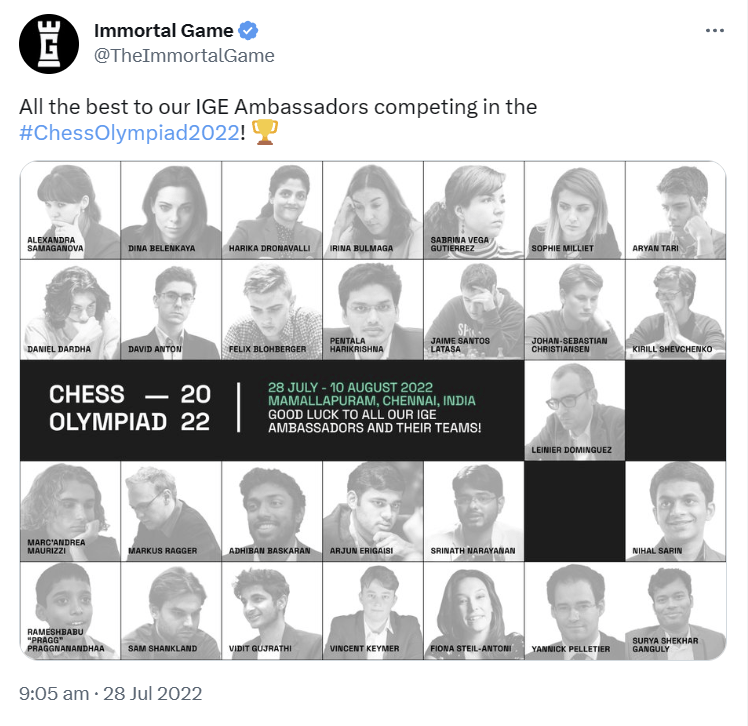
The long (but not fully complete) list of ambassadors of The Immortal Game. Source: Immortal Game’s Twitter
Are you really going to tell me that all these players and personalities are struggling to make ends meet and had no choice but to accept this partnership? That someone like Arjun Erigaisi who had signed a lucrative, $1.5 million sponsorship deal earlier that year is in desperate need of some extra cash to promote such a scam? 22 Or do you really believe that all these ambassadors enjoy playing in The Immortal Game playzone and use it every day? That they are even fully familiar with the entire Play-To-Earn concept, to begin with?
I really think there should be some ethical and moral standards when it comes to accepting sponsorships. I fully agree with IM David Pruess of Chess Dojo who recently wrote an open letter to chess influencers and asked them to take more responsibility for the companies and products they are promoting.
In an ideal world, I dream of people only actually promoting products they are using themselves. But at minimum, I would love to see chess personalities exercising due diligence, doing their research, and being much more picky when it comes to sponsorship opportunities.
Because if you don’t, in the best-case scenario you might end up promoting a shady product or an outright scam to your followers.
And in the worst-case scenario – you might get sued for that.
Thou Shall Not Resort To False/Misleading/Dishonest Advertising
Paid sponsorships are not the only way of promoting products and services that I heavily dislike within the chess world. 23 I also heavily dislike the way chess marketing works these days and the way chess products and services are being advertised.
In recent times, we are witnessing an increased use of hyperboles, overly hyped sentences and gloated promises when it comes to chess marketing. Every chess course nowadays is razor-sharp and practical, and leading to advantage in every line, and easy to understand, and practical despite having 23-move-long-computer lines, and novel and fresh, and thoroughly engine checked, and practical, and full of sizzling novelties, 24 and backed up by database statistics, and tailored specifically for your needs, and approved by the engines and grandmasters and influencers, and oh, have I mentioned practical?
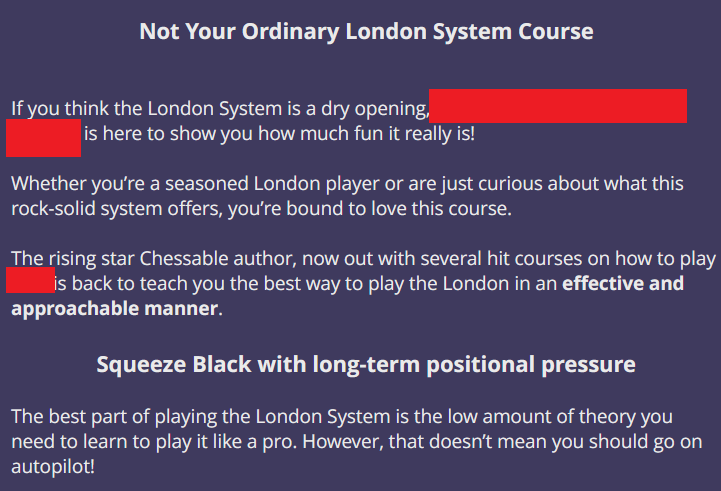
Yeah, London is really fun (?) and you don’t need any theory to play it like a pro (??). Note that this is not a shot at the author of this course as I can personally confirm his courses are some of the best courses on Chessable.
Every chess coach nowadays has ten years of experience, good pedagogical skills, hundreds of students from all over the world, untried and untested methods that will help you gain hundreds of rating points in the span of a few weeks, and top-notch opening files that will turn you into Daniil freaking Dubov overnight. 25
Every new chess company has a revolutionary new technology to change the way the game is played and studied, every chess YouTuber is there to provide you with THAT ONE SECRET to win all your chess games, every chess event is the greatest and the most hype event in the history of the game…
Oh, and let’s not forget chess podcasters that help you learn chess with more clarity and fun since they are “guided by their desire to do good”:
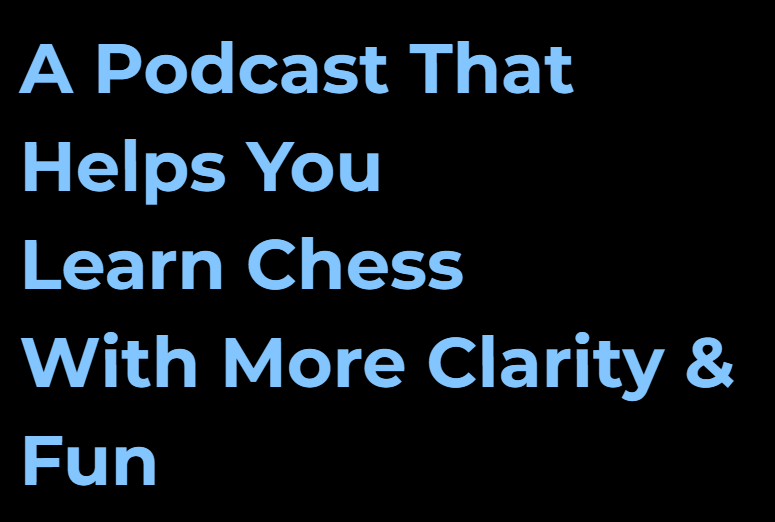
A bigger man than me would probably not single out any specific names, but given the manner in which the host of this podcast misrepresented my previous article in his tweet and blocked me without a chance to respond, AND given the fact his messaging is the very embodiment of the problem I am talking about, I will allow myself to be petty. Besides, as I replied to one of my friends who asked me whether I can ever be a bigger man: “Have you ever met me?”
You get the point.
I find the use of this kind of language and this way of advertising very off-putting at best, and false and misleading, at worst. It reminds me of those horrible ads promising to teach you either a musical instrument or a foreign language in just a matter of a few days. 26

If I can paraphrase famous words of Mr. Svidler: “Nooooo, Lawrence, that is not how piano learning works, sadly”
And I know some of you reading this might say: “But Vjeko, why are you getting so worked up? It is just regular advertising. It is how marketing works, has worked, and how it will always work. Besides, it obviously yields results, no?”
Well, first of all, I am not 100% sure whether this is how marketing has always worked. I do get the feeling that this kind of messaging has become more and more dominant mainly in the last decade or so – ever since social media first appeared. Just like in many other spheres – I do have a feeling it is more important to capture someone’s attention with bombastic statements, rather than what these bombastic statements actually contain.
Secondly, I really don’t think this way of marketing and the way modern-day advertising works is very beneficial on a macro scale – even if it does yield results on a micro scale. As I mentioned in the Introduction, the central theme of the book The High Price Materialism is the negative effect of overemphasizing materialistic values on our individual and collective well-being.
In that vein, the book also devoted a lot of attention to marketing/advertising and describes how our materialistic viewpoint is shaped due to the constant exposure to ads from a very early age. The author even proposed a very radical idea of “advertising-free” zones:
“I believe we should work to declare advertising-free zones. At the top of my list would be schools, roadways, and public spaces such as subways and buses. Some states have already moved in this direction, deciding that scenery is more important than billboards telling us how far it is to the next McDonald’s.”
While I also very much liked the part of the book where the author proposed completely changing the landscape of modern marketing:
„An even bolder step would be to consider advertisements as a form of pollution. […] Advertisements appear to be detrimental to people’s well-being. Just as the government taxes companies that spurt noxious chemicals from their smokestacks, perhaps we should assess a tax on advertisers who spew materialistic messages. Some might try that this limits freedom of speech, but […] we must always wonder about the relevance of free speech when companies pay thousands of dollars per second to display their messages.
Imagine if […] advertising and marketing companies found themselves in the same position as cigarette companies: they have to develop ads showing that their product is harmful. Television shows would be interspersed with reminders that buying products will not really satisfy your psychological needs or make others love you in an authentic way. Instead, advertising companies would emphasize that any product’s utility is limited to helping you get back and forth to the office or to removing spots from your clothes, but really nothing more.”
Of course, the good thing about chess products and services is that they can hardly be harmful. But I nevertheless wish the way marketing worked within the chess world 27 was fundamentally different.
I guess I can only dream.
Thou Shall Not Abuse Your Power And Influence For Personal Gains – Especially If You Are A Member Of A Public Organization
As can be deduced from what I wrote above, I do believe that individuals (and entities) that have power and influence are responsible for how they use that very power and influence. I think it is highly unethical to abuse/leverage power or influence for personal gain.
And as problematic as I find it when private individuals and entities do it, 28 I think it is even more problematic when it is done by members of public organizations, that are supposed to be run on a non-profit principle and serve the game of chess instead of its members.
Unfortunately, just like in many other sports/fields, the biggest culprit is the international governing body – FIDE, which has a long-lasting and proven track record of corruption, malpractice, and power/influence abuse. It is so deeply ingrained and such a well-known fact that I don’t even feel the need to pinpoint concrete examples. I believe everyone who has spent some time within the chess world knows what I am talking about. 29
Unfortunately, these tendencies are not restricted only to FIDE but are rather characteristic of almost any public chess organization. Continental organizations such as ECU 30 have also had their own share of issues. And on a more personal level, I can definitely confirm corruptive practices and unethical standards are very much present within national chess federations such as Croatian Chess Federation. 31
Of course, it is probably very naive and idealistic to expect some sort of moral codex from any organization that is actually political in its nature (and chess federations definitely are). But it still makes me extremely frustrated and sad to constantly run into vivid examples of power abuse and corruption – in particular when it is happening in front of my nose and in my home country. 32
Thou Shall Not Hide Everything Behind The Paywall – Especially If It Is Available For Free Elsewhere
A very common business model in the 21st century is the so-called “Freemium” business model, which incorporates providing the users with a small chunk of your products/services/features for free and hiding the rest behind a paywall.
It is certainly a legitimate and relatively transparent concept and I don’t have any particular issues with it. What I have issues is the way it is often implemented in practice. More concretely – I often have issues with what individuals and businesses implementing it do offer for free, and what remains hidden behind the paywall.
I actually think there are companies within the chess world, such as Chessable, that implement the freemium model very well, offering a very fair share of their products for free, and that don’t really restrict the core functionalities of their Move Trainer technology to the premium users of the website.
But more often than not, what is being offered for free is peanuts compared to the entire product – and features hidden behind the paywall are often so essential that they make the free use of the product completely futile.
As an example, let’s take look chesscom’s three levels of membership,
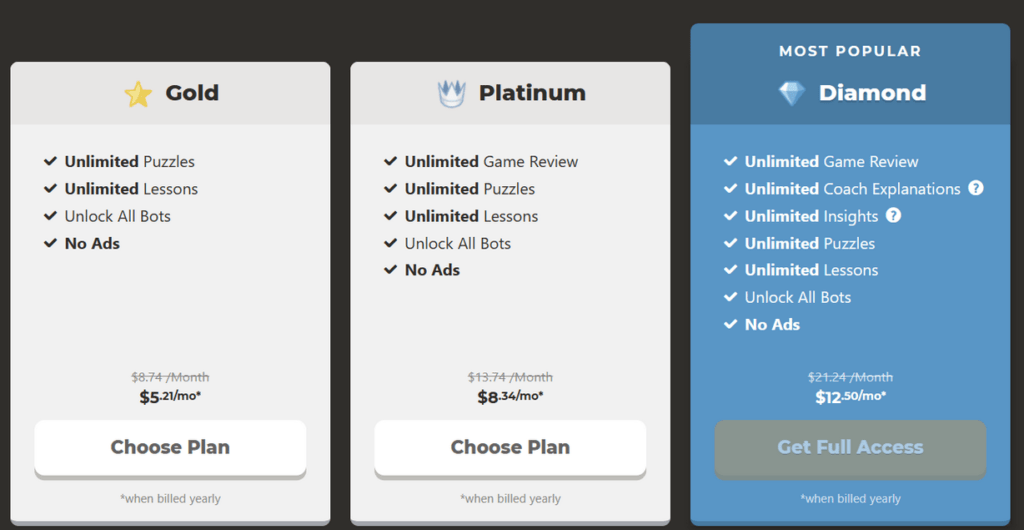
Image source: September 1st plan changes – Chess.com Member Support and FAQs
and then let’s see how the benefits they provide compared to the features available to non-paying members:
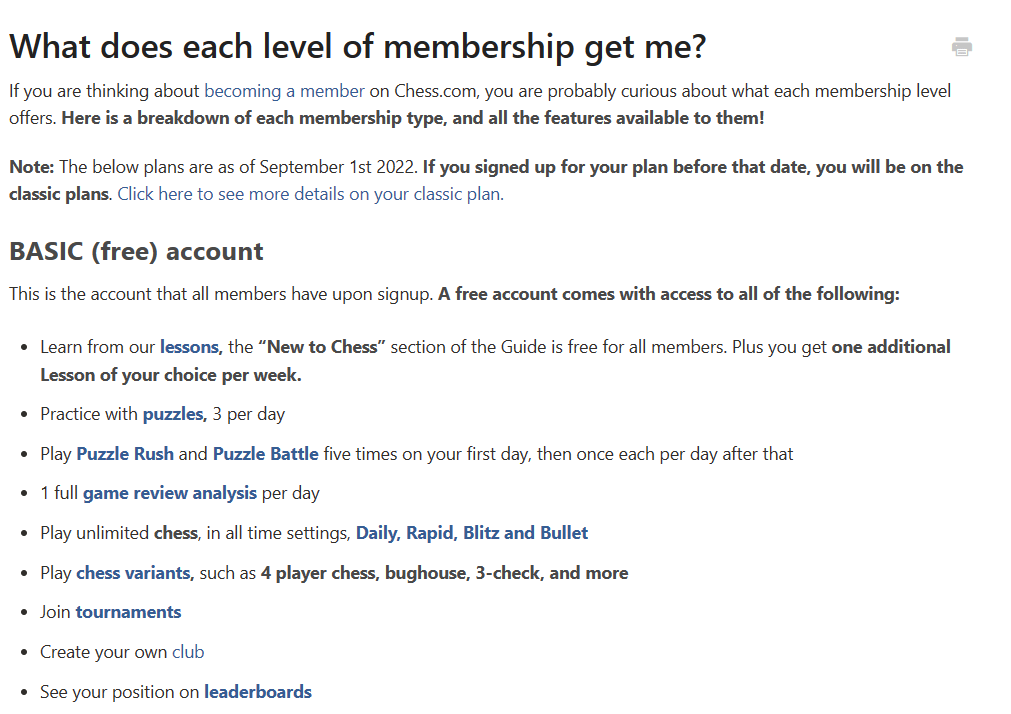
Source: What does each level of membership get me? – Chess.com Member Support and FAQs
Quite honestly – I do think that the discrepancy between the paying and non-paying members is too large. Not only do the non-paying members have severe restrictions when it comes to accessing exclusive content on the website, 33 but they also get severe restrictions when it comes to using some of the core functionalities of the website, such as puzzle solving, playing puzzle rush or even analyzing their own games.
I am aware that this business model works and that people are willing to pay for these features. But as I explained earlier – I don’t really believe in the whole “People are willing to pay” argument. I believe that businesses – and not customers – retain the responsibility for the product they are offering. Especially since chesscom’s audience consists of many people relatively new to the game 34 who simply don’t have an overview of what is available on the market or ideas how to accurately value a chess-related product or feature.
I think this is especially problematic since many of those hidden behind the paywall are not particularly revolutionary, difficult to implement – and are available on many other platforms for completely free. Don’t get me wrong, I am not one of those average r/chess users that go around shouting chess.com bad lichess good. 35 I understand there is a difference between a for-profit and a non-profit company.
I also know there aren’t any rules or guidelines when it comes to freemium models. Deciding what is worth hiding behind the paywall is quite subjective and unclear and ultimately left to the business to decide.
I just wish companies such as chess.com would implement the freemium model more like Chessable and less like chess.com. That they would put a paywall only on those features and products that weren’t available elsewhere and that provide their users with unique value. 36
Thou Shall Not Sell Your Chess Games
Anyone who has spent some time in the chess world has heard stories about chess games being rigged.
I am not exclusively talking about the long-lasting habit of prearranging draws. 37 What I am talking about here is the relatively common practice of rigging the result of a chess game by intentionally losing it – usually for a certain compensation/fee.
This practice is much more widespread than people think. Over the years, I have heard multiple stories of games being thrown for different reasons – most commonly in order to ensure one side wins a prize at a tournament or to ensure one side will get their norm. 38 I have personally been asked to throw a game at least two times in the last rounds of open tournaments in the last ten years. And while I do think it is more common in my country (and Eastern Europe) than in some other places, I am sure this happens all over the world.
Needless to say, the practice of selling chess games is deeply unethical. 39
I sincerely believe we as a chess community should fight against it all on fronts.
And report all potential instances of it happening to relevant bodies and organizations.
Conclusion: A Personal Perspective
Thus, we have finally reached the end of this article. Even though it ended up being way longer than I anticipated, 40 I still have a feeling I have barely scratched the surface of this fascinating and complex topic. If you have any thoughts, opinions or disagreements, feel free to express them – either by commenting on this post or contacting me via Twitter or email.
Now, since I am aware that this article might come across as quite douchey and since I am aware many people might say it is very easy to do all the „high ground” talking before we depart, I would like to say a couple of more things.
First of all, allow me to acknowledge that I am very much aware of my very privileged situation. I currently live in a place of my own, provided to me by my parents. I live in a relatively cheap country, I don’t have children and my general expenses are rather low – which makes it much easier for me to start preaching anti-materialism compared to many others.
Secondly, I would like to point out that everything written above is not just some preaching of someone completely unrelated to chess, but of someone who very much has his „Skin in the game”. Slightly more than a year ago, I quit my well-paid job at Chessable to try and pursue a career as a freelancer. This career is, at the moment of writing, not yet fully sustainable. I certainly know from personal experience how it is not easy to make a living within the chess world – even in the 21st century.
However, just because it is not easy, doesn’t mean we should drop all moral considerations and resort to unethical ways of making money (in chess). I do really believe that the chess world is headed in a very negative direction against which it is very much worth fighting for.
Because in contrast to the popular notion – most of us DO have a choice.
What will be yours?
- Even top players often struggled with it. There are many examples of chess top players having to have an alternative profession throughout the history of our game.
- Given that I am trying to do the same, I would be a big hypocrite otherwise
- Such as freedom, authenticity, autonomy, and self-actualization, to name a few. Although the book goes very deeply into the whole value discussion, too.
- And not only the chess world
- I will not name any specific examples, but historically there have been some really lackluster products on the market
- I have heard more than one Eastern-European Grandmaster expecting they should be showered in gold until the rest of their life because “I am a GM”. And that is not even to say that quite a few of them obtained that title under very shady circumstances.
- Or not doing it at all
- Or the Bible!
- In which case it is probably easier to get an official position at FIDE and to become, say, Director of Chess Development
- Ironically enough, I kinda changed my attitude after discussions that occurred on a Twitter thread where – I mocked Maxim Dlugy for charging 250 USD/hour for lessons. I do still believe this is a bit of a high price to watch someone cheat in Titled Tuesday and that there should be a ceiling for the price of a single chess lesson – just like anything else. It is just not 100% clear to say where exactly it should be.
- As I wrote in the introduction
- While also doing their job half-assedly
- As mentioned above, it is not always clear whether this is the consequence of greed or necessity. Although more often than not, companies do increase the prices of their products because “people are willing to pay for them”. I fundamentally disagree with this reasoning as I think it is the company’s responsibility to price the product optimally on the basis of the investment necessary to create it. Although I am sure some people well-versed in the economic theory – hi Rok – will highly disagree.
- As if top chess players are living poorly. Just as I am writing these lines Fabiano Caruana won 100.000 USD first prize in the Superbet Romania leg of the Grand Chess Tour. Yes, it is peanuts compared to, say, football and tennis. But it is more than enough for a very nice living, won’t you agree?
- This is not that surprising, though. Regular readers of the stuff I wrote might recall I already complained about Levy propagating materialistic values in a different shape and form (fame and clicks) in a previous newsletter on this blog.
- Unfortunately (or fortunately?!), chess is not the only niche that these cryptocompanies have infiltrated, though. For example, the NBA venue of the LA Lakers was recently renamed from Staples Center to Crypto Arena. Sapienti Sat.
- And this comes from someone who actually did invest in the crypto and made a nice chunk of money, before eventually withdrawing it all and getting away from that shit after the FTX crash
- Of course, you could say that it is not the same if a private individual or a public company signs a sponsorship deal. But in my book, both have a lot of influence and should be held to similar moral standards.
- If you stretch the argument and start straw-maning, you could argue what even is a reputable company and how many “established” clothing companies run sweatshops in the third world countries. And this is why it is indeed dangerous to start threading the morality question, but I feel there is a difference between companies producing reasonable products made in shady ways and companies creating shady products.
- Read: Hated
- In a nutshell, “Play to Earn” games allow players to “earn money” by trading the assets collected within the game for NFTs. There are numerous issues with this entire concept that are nicely summarized in this article, which was published on a crypto-related website! Oh, not to mention that even the FBI issued a warning about these types of games, albeit in mobile form.
- While we could debate about whether companies such as Coinbase or Crypto.com can be considered shady or not, I don’t doubt for a moment that The Immortal Game and the entire Play-To-Earn concept is a massive scam. As anyone who has ever read my Twitter is probably aware anyway.
- And not only within the chess world
- A true formulation taken from one of the blurbs on Chessable
- These are quite often simply pirated from some illegal sources. I have had a potential coach openly tell me he has a big database of downloaded Chessable courses before our first lesson.
- The title of the article can be translated as The Revolutionary Method for learning a language in 3 days – a myth or a reality
- And not only the chess world
- As in the case of many of the sponsorships mentioned above, although I am sure many people will not agree because free market and stuff
- And if you really don’t, feel free to google it. Feel free to start with “List of FIDE Presidents” or “FIDE controversy” and brace yourself for a long haul
- European Chess Union
- I could write an entire article about this topic, as well, but that could actually land me in some significant trouble, so I will leave it at that. From what I have heard from other people, many national chess federations have such issues – especially if located in countries where they receive a substantial amount of funds from the government.
- Although it really shouldn’t surprise me given that I have been living in Croatia for the last three decades now.
- Which is perfectly okay
- #growthegame
- Although it is not only lichess – you can solve as many chess puzzles as possible on multiple websites. Chesstempo being the main one I personally use these days
- Although it seems more likely that chess.com will influence the way Chessable does business rather than vice versa in the aftermath of their merger. Chessable recently revamped the outlook of its PRO membership. In my opinion, this takes their freemium model in the wrong direction, because I do feel some of the features such as Chess Board Customization should really not be behind the paywall (although note that I am not 100% sure how fundamentally this PRO offer is different from the earlier one).
- Although I think this is also a very harmful practice that should be abolished.
- This is very common in round-robin closed norm events – just remember Karjakin’s case. This is one of the reasons why these events are often considered to be somewhat suspicious. Since this topic is quite relevant these days due to all the controversy related to hybrid events, I was even considering talking in greater depth about it in this article but ultimately concluded it doesn’t fully fit in its topic.
- Probably much more than anything else on this list
- Which is the case with most of my articles – you might have figured out that Laconica Brevitas is not one of my stronger suits

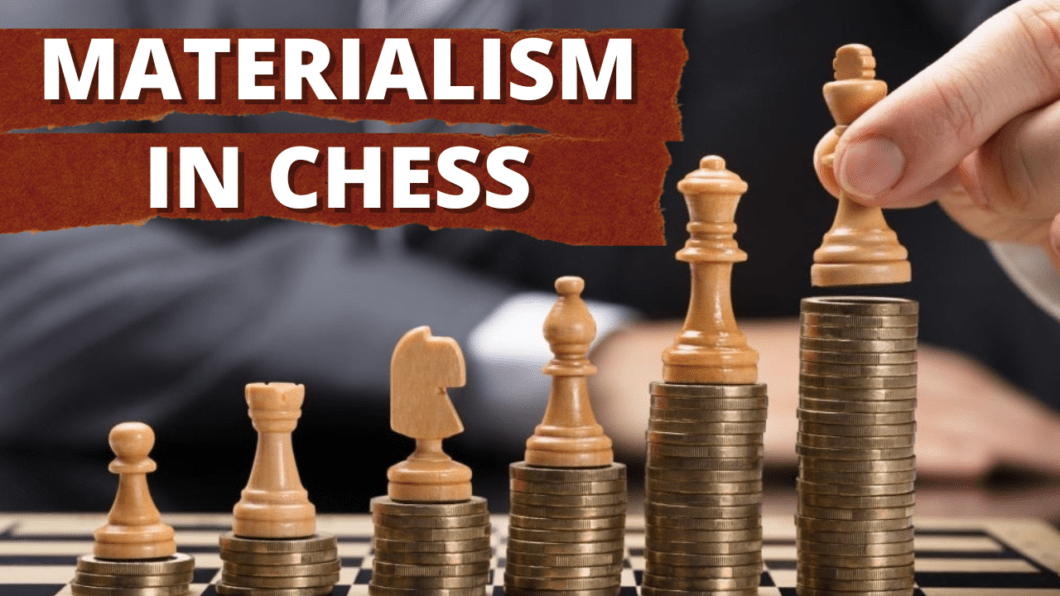
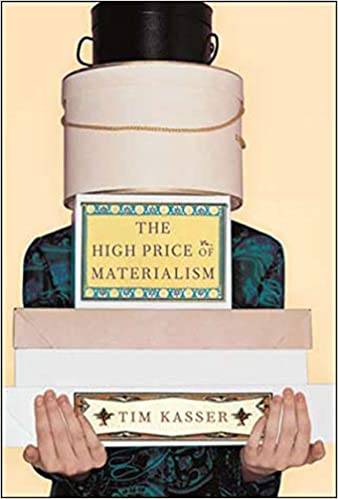
Although I don’t agree with everything you wrote in this article, I appreciate your position and striving for more ethical behaviors in the chess world. However, compared with other areas of life (banking industry ?), chess is a very ethical place in general, believe me ! 🙂
I don’t mind companies charging large amounts of money in chess because chess products aren’t essential. You need housing, food, clothes, access to education, but you can actually live a good life without chess.com’s premium or the latest London course. And you can even derive a lot of pleasure from your chess this way. So it’s up to the customer to decide what has value for him and what to do with his money.
If I had to point one unethical piece of business in chess, it’s the topic I wrote you about a couple years back when you were still working at Chessable : the company was advertising and selling a community work produced by a known and banned cheater : “Indrerk”. This I found extremely unethical because the product should have clearly been labelled as “written by a 1500 player banned twice for cheating online” so customers could choose if they wanted to pay for a cheater’s work or not. That was a miss.